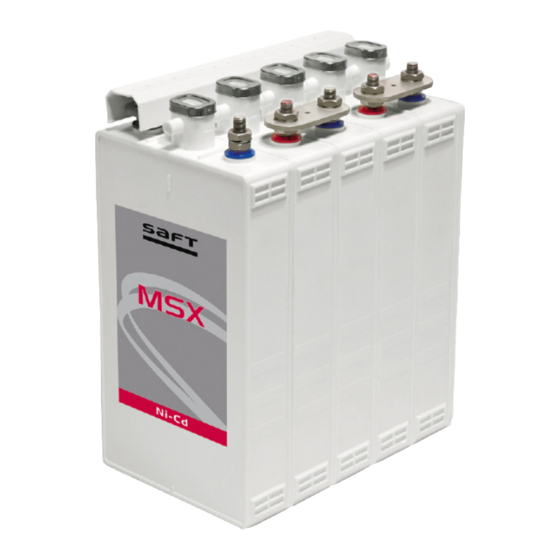
Table of Contents
Advertisement
Quick Links
MSX Ni-Cd batteries
Installation and operating instructions
Important recommendations
Never allow an exposed flame or spark near
the batteries, particularly while charging.
Never smoke while performing any operation
on the battery.
For protection, wear rubber gloves, long
sleeves and appropriate splash goggles or
face shield.
The electrolyte is harmful to skin and eyes. In
the event of contact with skin or eyes, wash
immediately with plenty of water. If eyes are
affected, flush with water and obtain
immediate medical attention.
Remove all rings, watches and other items
with metal parts before working on the
battery.
Use insulated tools.
Avoid static electricity and take measures for
protection against electric shocks.
Discharge any possible static electricity from
clothing and/or tools by touching an earth-
connected part "ground" before working on
the battery.
1. Receiving the shipment
Unpack the battery immediately upon arrival.
Do not overturn the package. MSX batteries are
shipped filled with electrolyte and no topping-
up of the electrolyte has to be performed upon
reception of the battery.
Make sure all items have been received by
comparing with the packing list.
Check for damage or electrolyte spillage.
Report any irregularities to the carrier and
Saft.
Never operate the battery with colored
transport seals inserted on the outlet and
inlet of each module as this will damage
permanently the battery.
2. Storage
Store the battery indoors in a dry, clean, and
cool location (0°C to +30°C/ +32°F to +86°F).
Make sure that the plastic strapping and front
plates remain in place during storage (for
blocks delivered without metallic frames).
Do not expose to direct sunlight or excessive
heat.
A battery delivered charged (80%) must not
be stored more than 3 months up to 30°C, or
more than 6 months up to 20°C (including
transport). If a charged battery has to be
stored for more than the durations and
associated temperatures mentioned above,
discharge the block battery at 0.2 C
1V per cell or less.
A battery delivered discharged and filled may
be stored for many years before it is installed.
If storage is required prior to commercial
service, clean and coat the metallic parts with
a thin layer of neutral vaseline or neutral
petroleum jelly grease approved by Saft.
Leave the battery in its transport case to
protect from dust, moisture and short circuits.
3. Installation
Remove the transport seals.
3.1.Battery configuration varies depending on
the requirement.
Block battery directly fitted inside a battery
box.
Block battery to be installed by customer in
battery box designed by Saft. In this case, the
block battery is delivered with two front plates
and plastic strapping used for shipment and
handling. Front plates and plastic strapping
must be removed just before battery
installation. Don't remove the front plates and
plastic strapping if the battery is stored.
Block battery to be managed directly by the
customer. In this case the block batteries are
delivered in light self-keeping cradles. Never
remove this assembly.
3.2.Verify that cells are correctly interconnected
and battery is correctly connected to the load.
3.3.Check torque of terminal connecting
screws.
Torque must be: 10 ± 2 N.m.
A down to
5
Connections and terminal screws must be
protected against corrosion by coating with a
thin layer of DW33 anti-corrosion greasy film.
4. Water filling system
installation
Remove transport seals and connect
hydraulic tubing between block battery
according to the battery drawing delivered
by Saft.
Saft's water Filling Systems follows specific
rules, please respect carefully Saft's battery
drawing for installation.
Make sure that the pipes are completely
inserted to ensure a good tightness.
Hydraulic connection of cells is in parallel to
the electrical connection in order to avoid
voltage differences of more than 1.2V
between two cells connected by this method.
The hydraulic connection must be horizontal
in order to avoid any siphon.
The water filling circuit outlet must not be
located close to electrical equipment and
electrical circuit or metallic structure.
Water filling circuit input must be connected
to the self-closing inlet.
When installed, check the water filling circuit
for continuity (no obstruction) and tightness
(no leaks) using a pressure test (a kit may be
supplied by SAFT).
June 2020
Advertisement
Table of Contents

Subscribe to Our Youtube Channel
Summary of Contents for MSX MSX70
- Page 1 Unpack the battery immediately upon arrival. Saft’s water Filling Systems follows specific Block battery directly fitted inside a battery Do not overturn the package. MSX batteries are rules, please respect carefully Saft’s battery box. shipped filled with electrolyte and no topping- drawing for installation.
- Page 2 MSX Ni-Cd batteries 5. Commissioning The battery is ready for use. Table A: Caution: during constant current charging Cell type Rated Charge 6. Charging in service capacity current operations, the battery box must be open. 1.47 V/cell at +20°C (+68°F) with voltage 5.1.The batteries are delivered 80% charged.

Need help?
Do you have a question about the MSX70 and is the answer not in the manual?
Questions and answers